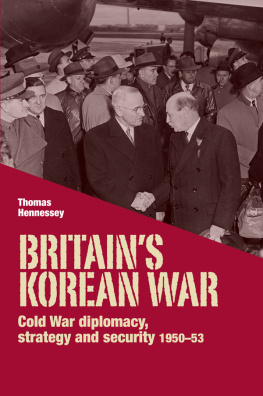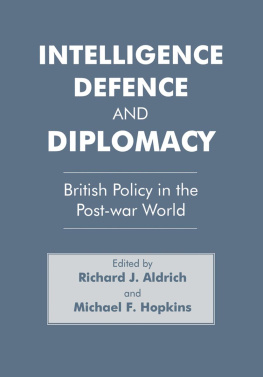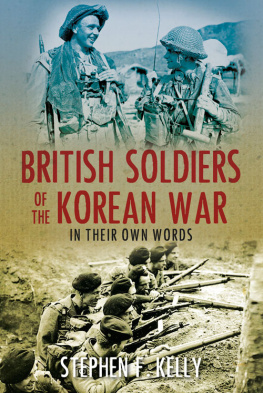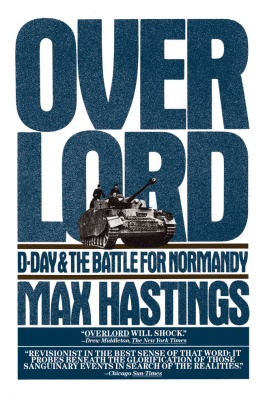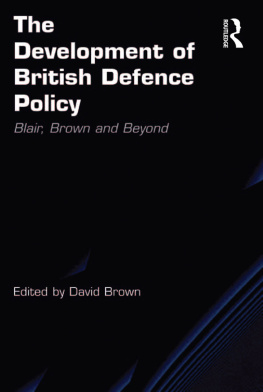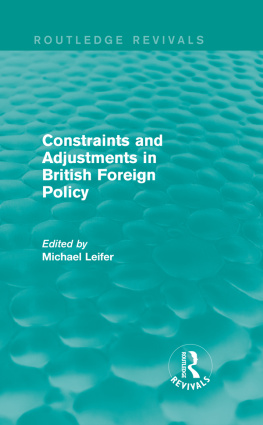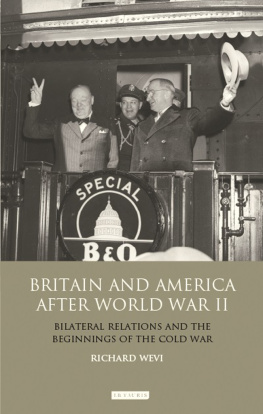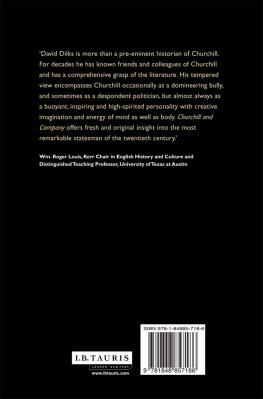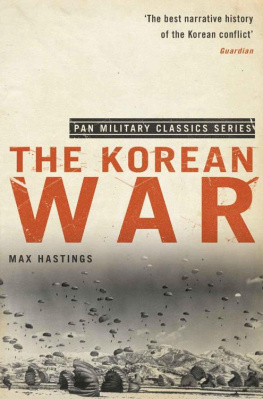Britains Korean War
Cold War diplomacy, strategy and security 195053
Thomas Hennessey
Manchester University Press
Manchester and New York
distributed in the United States exclusively by Palgrave Macmillan
Copyright Thomas Hennessey 2013
The right of Thomas Hennessey to be identified as the author of this work has been asserted by him in accordance with the Copyright, Designs and Patents Act 1988.
Published by Manchester University Press
Oxford Road, Manchester M13 9NR, UK
and Room 400, 175 Fifth Avenue, New York, NY 10010, USA
www.manchesteruniversitypress.co.uk
Distributed in the United States exclusively by
Palgrave Macmillan, 175 Fifth Avenue, New York,
NY 10010, USA
Distributed in Canada exclusively by
UBC Press, University of British Columbia, 2029 West Mall,
Vancouver, BC, Canada V6T 1Z2
British Library Cataloguing-in-Publication Data
A catalogue record for this book is available from the British Library
Library of Congress Cataloging-in-Publication Data applied for
ISBN 978 0 7190 8859 9 hardback
First published 2013
The publisher has no responsibility for the persistence or accuracy of URLs for any external or third-party internet websites referred to in this book, and does not guarantee that any content on such websites is, or will remain, accurate or appropriate.
Typeset
by Carnegie Book Production, Lancaster
For Sean Greenwood
Contents
BJSM | British Joint Services Mission |
BRPWIU | British Repatriated Prisoner of War Interrogation Unit |
CAS | Chief of the Air Staff |
CIGS | Chief of the Imperial General Staff |
CMC | Collective Measures Committee |
CPG | Chinese Peoples Government |
DBOP | Documents on British Overseas Policy |
FRUS | Foreign Relations of the United States |
GA | General Assembly |
HMG | His/Her Majestys Government |
IRD | Information Research Department |
JCS | Joint Chiefs of Staff |
JIC | Joint Intelligence Committee |
MI5 | Security Service |
NATO | North Atlantic Treaty Organisation |
NCO | Non-commissioned officer |
NSC | National Security Council |
POW | Prisoner of War |
PRC | Peoples Republic of China |
RAF | Royal Air Force |
RNVR | Royal Navy Volunteer Reserve |
ROK | Republic of Korea |
UNO | United Nations Organisation |
UNSC | United Nations Security Council |
T his book is a study of Britains diplomatic, military and security policy during the Korean War as seen from the perspective of the British Government. This subject has attracted a limited, albeit, significant interest, among historians in contrast to what may be regarded as the defining event of the 1950s UKUS special relationship: the Suez crisis of 1956. Essentially, at various times, critics have argued that, in Danchevs description, the special relationship is not what it was, nor what its fervent believers would like it to be. The party is over, but the guests linger, reluctant to separate, spellbound by the storied past.1 But, despite its often predicted demise, Marsh and Baylis have termed this special relationship the Lazarus of international relations. They argue that its survival owes much to four principal continuities in the post-Second World War approach of British foreign policy-making: a determination that Britain remain a global actor; the continuing reality of US power; an enduring calculation that a position closely related to, but independent of, the United States has best served UK interests since the Second World War; and a persistent assumption that a combination of consanguinity and superior British diplomatic wisdom that allows British policy-makers to guide the nave American giant. A series of other continuities, suggest Marsh and Baylis, have flowed directly from the last of these to underpin Anglo-American cooperation, irrespective of periodic differences and international systemic change. The first of these is the continuing importance of the symbols, memories and practices to Anglo-American specialness. The second is a consistent willingness of British policy-makers to pay the price of making the special relationship forward-looking and relevant to the United States. And, thirdly, UK policy-makers have employed a number of strategies designed to reinforce the Anglo-American relationship and guard against American desertion.2 In the context of the early Cold War an assessment of Anglo-American interaction in diplomacy has to take into account how, in Warners description, the disparity of power and influence between the UK and United States, during 1950, clearly show the dangers inherent in such a special relationship.3
Why Britain was even involved in the Korean War is important as the origins of the conflict are of academic controversy themselves. Cummings advanced the civil war thesis as a conflict emerging from a series of border clashes along the 38th parallel; this is his second mosaic argument: that South Korea provoked the war by its actions on the Ongjin peninsula and the Norths counter-attack; the first mosaic thesis is the view that the Soviet Union and North Korea launched a surprise attack on the South; the third mosaic thesis is the claim that the South launched a planned attack on the North. Youngho Kims view, however, maintains that Soviet documents reveal the border conflicts were the focal point around which the strategic calculations of Stalin and North Korea were made.4 The evidence provided for this interpretation appears convincing.
In the main British participation in the Korean conflict has been the preserve of a number of pioneering articles and chapters. At the centre of such works continues to be an attempt to understand the dynamics of the Anglo-American relationship, articulating differing degrees of British influence on American policy, during the war. MacDonald, on the other hand, has argued that: There is no evidence that British pressure prevented the Americans from adopting any course which they might otherwise have taken in the Far East. It was London and not Washington which made compromises for the sake of the special relationship. Korea exposed British illusions about guiding the American colossus and revealed, well before Suez in 1956, the shift towards US hegemony within the Atlantic alliance.5 Lowe, agrees, concluding that the significance of the war, for Anglo-American relations, was that it demonstrated beyond doubt how dependent Britain was upon the United States and that no special relationship existed.6 However, Lowe also appears to contradict himself, elsewhere, suggesting that President Trumans dismissal of the commander of United Nation (UN) forces, General MacArthur, in April 1951, was an example where British protests propelled Truman towards the point of decision.7 Belmonte, though, disagrees with this and, convincingly, demonstrates that British pressure was less significant than the internal strategic and political calculations bearing on Washingtons decision-making. The Truman administration did something the British wanted, but for its own reasons and to suit its own perceived interests.8 That there was, certainly, a British belief that they could influence the Americans is the argument put forward by Ruane and Ellison: in 1952, the Foreign Secretary, Anthony Eden, raised the concept of power-by-proxy from a desire to a need, given a recurrence of Britains balance of payments crisis with the goal of maintaining the UKs position as a world power.9 As Dockrill has pointed out, the Foreign Office and its political masters regarded the United States as relatively inexperienced in world affairs and so would be willing to listen to the sage advice of a more mature United Kingdom. For: British diplomats regarded the Americans as mercurial people who could not be relied on to follow a consistent course; and so only continuing British moderating pressure would keep the US administration on the right lines.10

